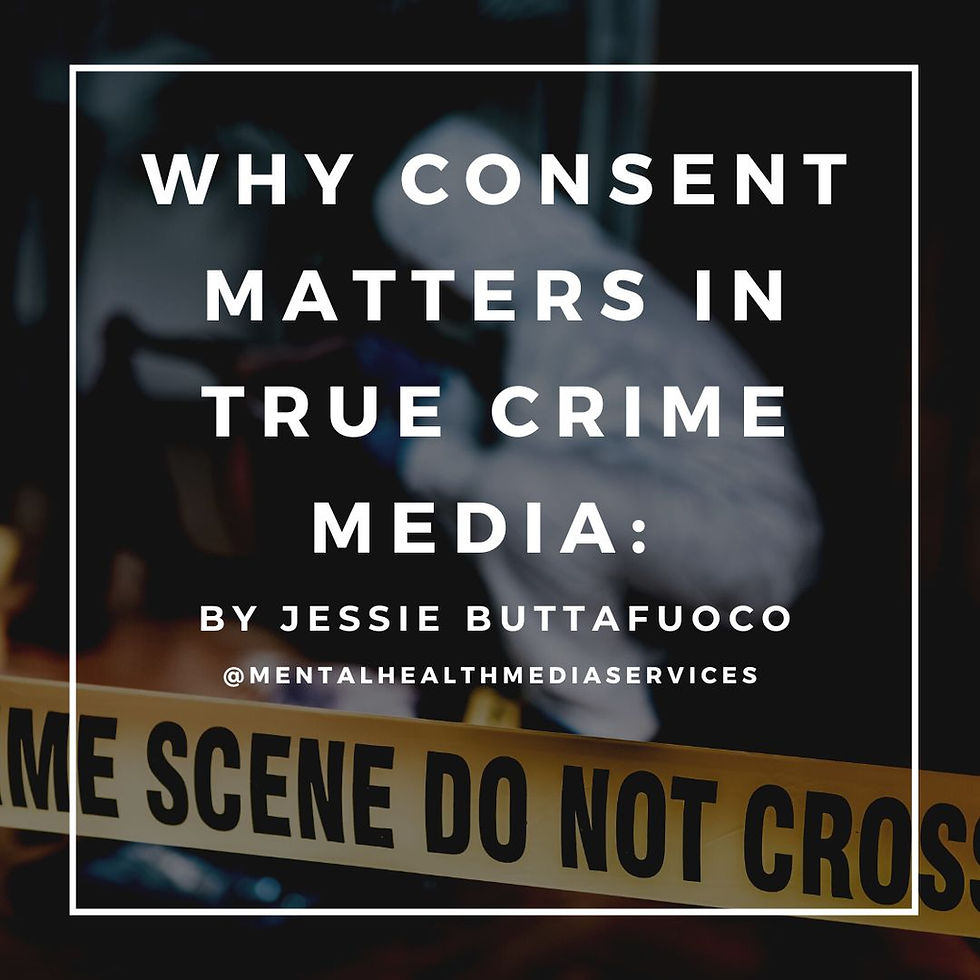Why Consent Matters in True Crime Media
- jessiebuttafuoco
- Jul 25, 2025
- 2 min read

By Jessie Buttafuoco, M.A, Clinical Psychology, M.A., Media Psychology
True crime has become a cultural juggernaut, filling our Netflix queues, podcast libraries, and primetime TV schedules. For audiences, it offers emotional gratification: a satisfying mix of suspense, justice, and insight into the darker corners of human behavior (Boling & Hull, 2018). But there’s a crucial voice missing from this conversation: the victims and survivors themselves.
There is a notable gap in academic literature regarding how victims and survivors experience being featured in true crime media. While audiences are drawn in by compelling narratives and shocking twists, the individuals at the center of these stories are often left reeling from the consequences of their trauma being sensationalized for public consumption.
When profit and audience engagement become the primary goals of mainstream media, the needs and perspectives of those represented are often marginalized (Otmar, 2024). This imbalance can lead to unethical media practices that prioritize exploitation over empathy and spectacle over sensitivity. True crime productions frequently capitalize on real, painful events, often without the input, knowledge, or consent of the people most affected (Pemberton, Aarten, & Mulder, 2019).
The psychological consequences are serious. Survivors of traumatic events report feeling re-traumatized, emotionally exhausted, and even publicly humiliated when their stories are told without care (Englund, Johannesson, & Arnberg, 2013). Armour (2003) found that the grieving process for families of homicide victims is often prolonged or intensified when their tragedy is made public. The loss of control over one's own narrative only compounds the trauma.
Editor I27, quoted in Mast (2016), chillingly acknowledged the power media professionals wield: “You can make someone look sympathetic, or like a big asshole. It’s very simple.” This power dynamic underscores the importance of consent. Without it, survivors risk being cast into roles they did not choose.
Moreover, manipulative editing and production tactics have lasting consequences. Mast (2016) calls for stronger ethical codes in media production, noting that current industry norms too often sacrifice human dignity for entertainment. When media narratives misrepresent, sensationalize, or exclude survivors’ voices, they not only cause psychological harm, they erase the very people they claim to represent.
Consent in true crime media matters. Ethical storytelling demands that survivors and victims’ families be given the opportunity to control how, when, and if their stories are told. Without this, we risk turning private pain into public spectacle and violating the humanity of the very people whose experiences we claim to care about.
The true crime genre doesn’t have to disappear, but it must evolve. Centering consent, adopting trauma-informed practices, and prioritizing dignity over drama are not limitations; they are the foundation of responsible storytelling. Because real people live behind the headlines, and they deserve to have a say.



Comments